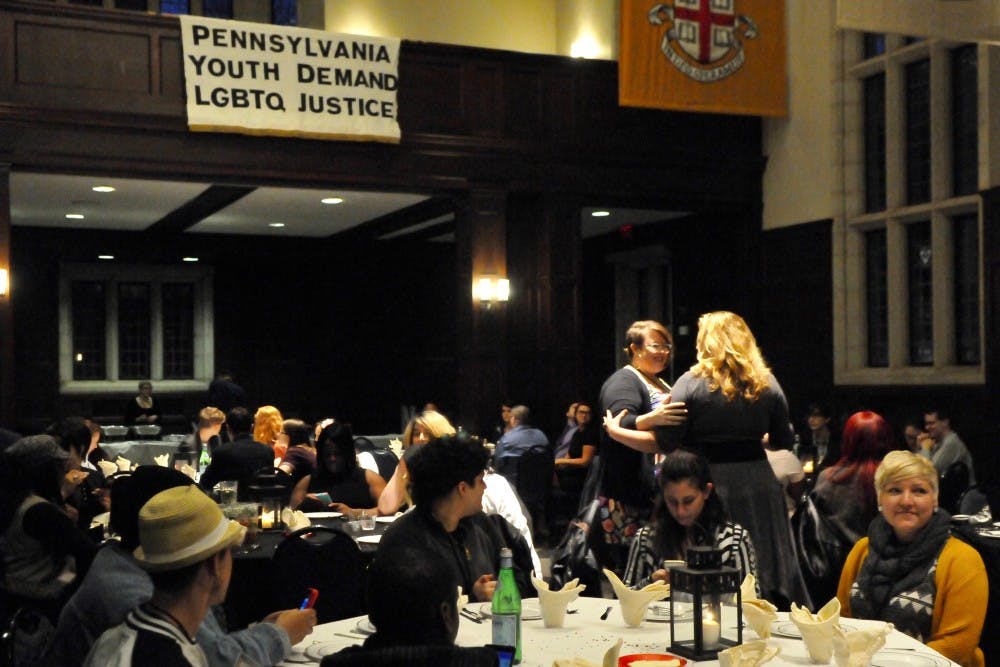
Over one hundred LGBTQ youth and allies from across Pennsylvania convened at the University for the three-day Pennsylvania Youth Action Conference.
Credit: Vanessa Weir , , ,
This past weekend, more than a hundred LGBTQ youth and allies from all over the state convened on Penn’s campus for the three-day Pennsylvania Youth Action Conference. This marks the third time that Penn has hosted the conference, which is in its fifth year.
This year’s conference theme was “The Future of Community Safety and LGBTQ Pennsylvania.” Reflecting this theme, many of the plenaries — sessions where all attendees come together to hear speakers — focused on ending violence against LGBTQ people, and in particular, transgender women of color. The conference also included a range of workshops, focusing on exploring the issue of LGBTQ youth homelessness, learning how to be an ally to transgender survivors of sexual assault and intimate partner violence and learning how to advocate for a trans-friendly campus.
Here’s a look at some of the conference’s major highlights.
Violence against transgender individuals
The opening plenary on Friday evening focused on the history of violence against transgender individuals and the current work and remaining work to protect transgender lives.
The first panelist, Deja Lynn Alvarez, is the director of the Divine Light LGBTQ Wellness Center, the first LGBTQ homeless shelter in Philadelphia. She also serves on the Philadelphia Police Liaison Committee, where she works to resolve historical and current tensions between the police force and the transgender community. In talking about the progress being made toward safety, Alvarez mentioned the passage of Directive 152, which establishes specific policies and procedures that police must follow in interaction with transgender individuals, such as respecting and using correct names and pronouns.
Alvarez was joined by Samantha Jo Dato, who is the coordinator of the Philadelphia Trans-Health Conference. She believes the majority of the directives that police are given to abide by are aimed for dealing with “people who are middle-class or who have home training” but not for people who are “left alone and abandoned, or someone who has no manners, or someone who is just living in the wrong environment and is just acting up.” She doesn’t think that Philadelphia is safe for transgender individuals, noting that “the life expectancy of a trans woman is 29.”
The panel also included Timothy Cwiek, who is a reporter for the Philadelphia Gay News and has worked for over a decade pressing police and city officials for transparency on a case involving the death of Nizah Morris, a young transgender woman of color.
Reforming the criminal justice system
The Saturday morning plenary focused on ensuring that black lives matter in Pennsylvania, and the afternoon plenary explored ways to reform the criminal justice system so as to better accommodate LGBQ people, but in particular, transgender individuals and those who do not identify within the binary.
Ciora Thomas, a transgender woman of color, recounted her time in Allegheny County Jail, where she was housed with men and assaulted by a particular guard for months. When asked whether she thinks the criminal justice system is broken, Thomas responded, “I think broken is the wrong term because it was never fixed.”
Moderator Naiymah Sanchez mentioned sitting in on a training where it was suggested that when a transgender person or gay man files a complaint, it’s because they are looking for attention.
The Prison Rape Elimination Act states that “genital status alone no longer determines where you are housed and in fact, where you know yourself to be the safest must be given the utmost consideration,” according to Nellie Fitzpatrick, the director of the Philadelphia Mayor’s Office of LGBT Affairs. The act must apply to federal prisons, but state prisons and county jails are able to decide whether to implement PREA or not.
Single-sex bathrooms and transgender rights
At the Commonwealth Banquet on Saturday night, Miss Major Griffin-Gracy, a formerly incarcerated black transgender woman who has been an activist for over 40 years, gave the keynote address. She reminded attendees to remember their history and those who have paved the way before them.
Griffin-Gracy brought up the controversy surrounding the use of single-sex bathrooms, saying, “Until they start putting men and women bathrooms in private homes, f**k you.” She continued, “We’re a part of this society. If they think they’re going to pull us over and push us back into the closet, I’ve got news. When I came out of my closet, I set the house on fire. I have nowhere else to hide, so deal with me. I’m here, and I’m going to win.”
2011 College graduate and 2014 PennDesign graduate Jason Landau Goodman — who is the executive director of the Pennsylvania Youth Congress, the organization that puts on the YAC — also spoke to the LGBTQ youth leaders.
“You are the state of the state,” he said.
The Daily Pennsylvanian is an independent, student-run newspaper. Please consider making a donation to support the coverage that shapes the University. Your generosity ensures a future of strong journalism at Penn.
DonatePlease note All comments are eligible for publication in The Daily Pennsylvanian.








